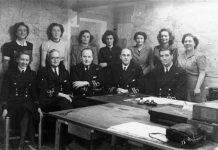Today in History – Friday, April 15, 2016
Today is Friday, April 15, the 106th day of 2015. There are 260 days left in the year.
Highlights in history on this date:
1689 – France’s King Louis XIV declares war on Spain.
1715 – Prussia, Saxony, Poland, Hanover and Denmark form alliance against Sweden, and war is declared.
1789 – President-elect George Washington leaves Mount Vernon, Virginia, for his inauguration in New York.
1856 – Britain, France and Austria guarantee integrity and independence of Turkey.

1861 – Three days after the attack on Fort Sumter, South Carolina, President Abraham Lincoln declares a state of insurrection and calls out Union troops.
1862 – A bill ending slavery in the U.S. District of Columbia becomes law.
1865 – Andrew Johnson becomes the 17th U.S. president after the assassination of President Abraham Lincoln.
1888 – Peasant uprising begins in Romania.
1891 – Katanga Company is formed under Leopold of Belgium’s direction to exploit copper deposits in what is today the southernmost province in Congo.
1912 – The passenger luxury liner S.S. Titanic sinks and more than 1,500 lives are lost; Harriet Quimby becomes the first woman to fly across the English Channel.
1923 – Insulin, discovered by Canadian Dr. Frederick Banting, is made available for general use by diabetics.
1927 – Chiang Kai-Shek organizes government at Nanking in China.
1941 – Yugoslav royal family flees to Great Britain. The postwar Communist regime later passes a law preventing them from returning.
1942 – Japanese artillery blasts U.S. positions on Corregidor Island in Philippines in World War II.
1945 – British and Canadian troops liberate the Nazi concentration camp at Bergen-Belsen.
1947 – Financier and presidential confidant Bernard M. Baruch says in a speech at the South Carolina statehouse: “Let us not be deceived. We are today in the midst of a cold war.”
1959 – Cuban leader Fidel Castro arrives in Washington, D.C., to begin a goodwill tour of the United States.
1968 – Two unmanned Soviet satellites link up while in orbit around Earth.
1974 – Military coup in West African country of Niger overthrows government of President Hamani Diori.
1977 – Protest marches in Pakistan become violent and at least eight people are reported killed.
1982 – Five militant Muslim fundamentalists are executed in Egypt for assassination of President Anwar Sadat.
1986 – U.S. President Ronald Reagan orders air strike on Tripoli and Benghazi in Libya 10 days after bombing of German disco kills two U.S. servicemen. Libya says the raids killed 41 people.
1987 – Philippines-flagged vessel sailing to Kuwait with load of Australian sheep is attacked and set ablaze by Iranian gunboat in central sector of gulf.
1988 – State of emergency is extended two additional months in Lima, Peru, to fight rising violence by leftist guerrillas.
1989 – Students in Beijing launch a series of pro-democracy protests upon the death of former Communist Party leader Hu Yaobang; the protests culminated in the Tiananmen Square massacre.
1992 – Sanctions go into effect against Libya for refusing to surrender two suspects in the bombing of Pan Am Flight 103.
1993 – A car bomb explodes at a shopping mall in Bogota, Colombia, killing at least five people, injuring about 100 and demolishing two dozen vehicles.
1994 – More than 100 nations adopt a 26,000-page agreement reforming international trade.
1995 – An express train plows into a crowded bus in the Nile Delta north of Cairo, killing 42 people and injuring 45 others.
1996 – More than 100 rebels ambush a six-vehicle military convoy near the border with Ecuador, killing 31 Colombian soldiers and wounding 16.
1997 – A fire sweeps across a pilgrims’ encampment outside Mecca as 2 million Muslims gather for one of Islam’s most sacred rituals, killing at least 343 people.
1998 – Pol Pot, leader of the Khmer Rouge, dies at 73, evading prosecution for the deaths of 2 million Cambodians in the 1970s.
1999 – NATO takes responsibility for the bombing of a refugee convoy in Kosovo the day before that Yugoslavs say killed 75 civilians.
2000 – Defying tear gas and police beatings, hundreds of supporters of jailed Malaysian politician Anwar Ibrahim mark the anniversary of his conviction with a protest that results in 46 arrests.
2002 – An Air China passenger jet crashes, killing at least 122 people. The jet flew into a hillside amid heavy rain and fog.
2003 – U.S. President George W. Bush declares an end to Iraqi President Saddam Hussein’s regime, less than a week after U.S. forces seized Baghdad and U.S. and Kurdish forces entered Kirkuk and Mosul in northern Iraq.
2004 – Two factions of the rebel National Liberation Front of Tripura in northeastern India agree to halt their two-decade separatist campaign and hold peace talks with New Delhi. A third NLFT faction continues to reject peace talks.
2005 – Flames and smoke send people jumping from windows of a budget hotel in Paris housing many African immigrants in an overnight fire that leaves 20 dead — half of them children.
2006 – China announces tariff cuts on imports of fruit and fish from Taiwan, offering the self-ruled island new trade concessions in an effort to boost sentiment for uniting with the communist mainland.
2007 – The remains of a World War II navigator, Air Force 1st Lt. Archibald Kelly, listed as missing in action for almost 63 years are identified two years after they were found in Croatia. His B-24 bomber crashed on July 22, 1944.
2008 – Nepal’s former rebels, now known as the Communist Party of Nepal (Maoist), win more than half of the directly elected seats that will shape the Himalayan nation’s political future.
2009 – About 100 young Afghan women protesting a law that lets husbands demand sex from their wives are pelted with stones by angry men who call them “dogs,” in a confrontation that highlights the explosive nature of the women’s rights debate in Afghanistan
2010 – An enormous ash cloud from a remote Icelandic volcano causes the biggest flight disruption since Sept. 11, 2001 as it drifts over northern Europe and strands travelers on six continents. Officials said it could take days for the skies to become safe again in one of aviation’s most congested areas.
2011 – The U.S. space agency NASA releases a trove of data from its sky-mapping mission, allowing scientists and anyone with access to the Internet to peruse millions of galaxies, stars, asteroids and other hard-to-see objects.
2012 -Taliban insurgents strike the heart of the Afghan capital and three eastern cities, firing automatic weapons and grenades at embassies, government buildings and NATO bases as they launch the spring fighting season with the boldest and most complex assault in years.
2013 – Venezuela’s government-friendly electoral council quickly certifies the razor-thin victory of President Hugo Chavez’ hand-picked successor Nicolas Maduro, ignoring opposition demands for a recount as anti-government protests break out in the bitterly polarized nation.
Today’s Birthdays:
Nanak, guru and founder of Sikhism (1469-1539); Leonhard Euler, Swiss mathematician (1707-1783); Henry James, U.S. author (1843-1916); A. Philip Randolph, U.S. civil rights leader/trade unionist (1889-1979); Bessie Smith, U.S. blues singer (1898-1937); Kim Il-Sung, North Korean dictator (1912-1994); Emma Thompson, British actress (1959–); Seth Rogen, Canadian actor/writer (1982–); Emma Watson, British actress (1990–).
Thought For Today:
Patriotism is your conviction that this country is superior to all other countries because you were born in it — George Bernard Shaw, Irish-born playwright (1856-1950).
Copyright 2016 The Associated Press. All rights reserved. This material may not be published, broadcast, rewritten or redistributed.




